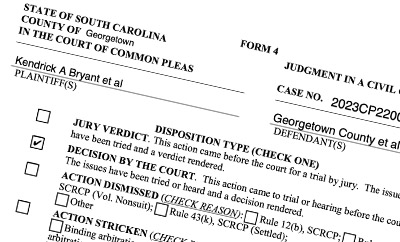Land use
Judge dismisses third lawsuit over multi-family projects

A third lawsuit challenging Georgetown County’s approval of multi-family development in the Pawleys Island area was dismissed this week by a Circuit Court judge. Like the two other suits, the suit filed by neighbors and citizens groups hinges in part on the role of the future land-use maps that are contained in the county’s comprehensive plan and the zoning ordinance.
“This is really the crux of the plaintiffs’ case,” Tommy Morgan, the assistant county attorney, said at a hearing last month. “They maintain that any type of conflict between any type of comprehensive plan and the ordinance must be resolved in favor of the plan.”
Judge Kristi Curtis this week granted Morgan’s motion to dismiss the suit and asked him to draft a formal order. She also granted a similar motion filed by Covington Homes, the developer of 12 townhouse units on Petigru Drive.
The Planning Commission recommended denial of the project after a hearing at which area residents raised concerns about traffic and drainage. They also said the density allowed in the “general residential” zoning for the 2-acre site was higher than the medium density designation shown on the future land-use maps.
County Council voted to approve the project saying it met the county’s development regulations and complied with the zoning. The suit also challenged the council’s role in the process, saying it violated state law and that the Planning Commission vote should have been final.
The suit filed by Keep It Green Advocacy was the fourth in 14 months seeking to overturn county land-use decisions. Two suits involved site plan approval of townhouse projects. A third followed a zoning change to allow construction of townhouses on a site previously zoned for a technology park. All those projects are in and around the Parkersville community.
The fourth suit involves a rezoning along Highway 17 south of Pawleys Island. The property owner is currently appealing a lower court decision dismissing his counterclaims.
“I’m again surprised, but not shocked,” Cindy Person, chief counsel for Keep It Green Advocacy, said of the latest ruling.
She argued in the other suits that court rules dismissing cases must only consider whether the complaint contains a valid cause of action. Patrick Hubbard, a law professor at the University of South Carolina, made the same argument before Curtis. He didn’t address the role of the comprehensive plan because to do so, he said, would involve facts not before the court at the hearing.
“It would be improper to grant a motion to dismiss,” Hubbard said.
Morgan argued that the suit didn’t present an issue for which the court can provide relief because of precedents that say legislative acts cannot be overturned unless they violate constitutional rights.
“A zoning decision does not infringe upon or destroy a citizen’s constitutional right,” Morgan told the court.
Although there are common issues in all the suits, Person said they have to stand up individually. On the heels of Curtis’s ruling, Person filed a notice of appeal this week in the tech park rezoning, which was dismissed by Judge William Seals in May.
The order, drafted by Morgan, said it was appropriate to dismiss the suit because the facts were not in dispute, only the interpretation of the law.
In court filings, Person argued that the judge improperly considered facts that were not included in the plaintiffs’ complaint in his decision to dismiss the suit.
Also, she argued that the court failed to consider that there are other grounds beyond constitutional rights that give the plaintiffs standing to bring suit.
“We’ll likely follow the same process” in the two other cases, Person said. “I am utterly astounded that a court would dismiss the cases at the stage of sufficiency of complaint. It’s surprising to every lawyer that I’ve run this by.”
Hubbard, who specializes in land-use law, will continue as co-counsel in the other cases, she added.
“We’re definitely in it for the long haul,” Person said.




